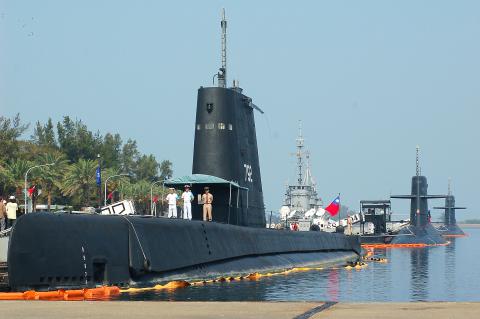Amid the lack of consensus on whether to procure or develop submarines, the navy’s lagging capabilities have become increasingly severe, a military analyst said yesterday.
Jyh-Perng Wang(王志鵬), associate researcher at the Association for Managing Defense and Strategies, said the nation’s Hailung-class Sea Dragon and World War II-era Guppy-class submarines were overburdened with numerous drills and battle missions, spending as much as 27 days per month at sea. The two Guppy-class are now used solely for training, -leaving only two Hailung-class subs for actual missions.
Wang said physical and mental stress in the navy, coupled with a “no hope for the future” mentality, could result in a wave of retirement among senior officers.

Photo: Hsu Shao-hsuan, Taipei Times
The 70-year-old Guppies, known as Sea Lion-class submarines, are in poor shape and require sustained maintenance, which is why every time the two submarines go out to sea, the Naval Command and Fleet Command are extremely nervous.
Crew on the subs are also constantly worried about accidents, which is why the burden now primarily falls on the two Dutch-made Hailung-class subs.
Sources have said that aside from battle missions, the two active submarines are responsible for “no-warning” and “warning” sea shark drills (or marine patrol operations), routine training assessment exercises by the fleet command, mine deployment and countering, as well as participation in the annual Han Kuang series of exercises. These drills take months to plan and execute, which could account for the exhaustion among officers.
Wang said that after more than 20 years of use, the Hailung-class subs were also getting old. When they entered service, they provided an edge against the vessels deployed by the People’s Liberation Army Navy, but now that China’s Song-class attack submarines were fitted with silencer tiles, it was time for the navy to retire its “-stegosaurus-class” subs and modernize.
Wang said he was concerned that salaries of between NT$30,000 and NT$40,000 per month offered by the navy were insufficient to retain personnel, since submarine crew are constantly under a lot of stress. The wave of senior officers who have retired early shows that the officers had lost confidence in the submarine fleet, which was a great loss for the navy.
ADDITIONAL REPORTING BY STAFF WRITER

SHIPS, TRAINS AND AUTOMOBILES: The ministry has announced changes to varied transportation industries taking effect soon, with a number of effects for passengers Beginning next month, the post office is canceling signature upon delivery and written inquiry services for international registered small packets in accordance with the new policy of the Universal Postal Union, the Ministry of Transportation and Communications said yesterday. The new policy does not apply to packets that are to be delivered to China, the ministry said. Senders of international registered small packets would receive a NT$10 rebate on postage if the packets are sent from Jan. 1 to March 31, it added. The ministry said that three other policies are also scheduled to take effect next month. International cruise ship operators

HORROR STORIES: One victim recounted not realizing they had been stabbed and seeing people bleeding, while another recalled breaking down in tears after fleeing A man on Friday died after he tried to fight the knife-wielding suspect who went on a stabbing spree near two of Taipei’s busiest metro stations, Taipei Mayor Chiang Wan-an (蔣萬安) said. The 57-year-old man, identified by his family name, Yu (余), encountered the suspect at Exit M7 of Taipei Main Station and immediately tried to stop him, but was fatally wounded and later died, Chiang said, calling the incident “heartbreaking.” Yu’s family would receive at least NT$5 million (US$158,584) in compensation through the Taipei Rapid Transit Corp’s (TRTC) insurance coverage, he said after convening an emergency security response meeting yesterday morning. National

PLANNED: The suspect visited the crime scene before the killings, seeking information on how to access the roof, and had extensively researched a 2014 stabbing incident The suspect in a stabbing attack that killed three people and injured 11 in Taipei on Friday had planned the assault and set fires at other locations earlier in the day, law enforcement officials said yesterday. National Police Agency (NPA) Director-General Chang Jung-hsin (張榮興) said the suspect, a 27-year-old man named Chang Wen (張文), began the attacks at 3:40pm, first setting off smoke bombs on a road, damaging cars and motorbikes. Earlier, Chang Wen set fire to a rental room where he was staying on Gongyuan Road in Zhongzheng District (中正), Chang Jung-hsin said. The suspect later threw smoke grenades near two exits

The Forestry and Nature Conservation Agency yesterday launched a gift box to market honey “certified by a Formosan black bear” in appreciation of a beekeeper’s amicable interaction with a honey-thieving bear. Beekeeper Chih Ming-chen (池明鎮) in January inspected his bee farm in Hualien County’s Jhuosi Township (卓溪) and found that more than 20 beehives had been destroyed and many hives were eaten, with bear droppings and paw prints near the destroyed hives, the agency said. Chih returned to the farm to move the remaining beehives away that evening when he encountered a Formosan black bear only 20m away, the agency said. The bear